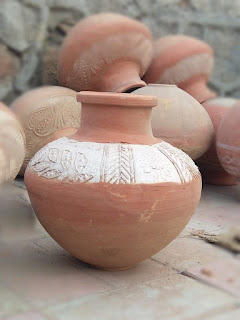All poured out
Imagine a grey-brown
earthenware jar. It sits on an old wooden table, in a farmhouse. Outside,
there’s a gentle breeze, and a rugged stone well sits next to a potato patch.
The jar looks
like it was well made, but also well used. Look closer, and you see
patches on the sides, the rim, and even the base.
Be quiet and listen.
There’s a drip. Then another.
Look even closer.
Water is slowly pooling on the table, around the base of the jar.
Pick up the jar and inspect it.
Careful, it’s heavy! Almost full of water, almost to the brim.
Lift the jar over your head, peer at the bottom, and you see it. There’s a spiderweb of tiny cracks, and water’s slowly seeping out.
Put the jar back down. Hmm.
You don’t see how the jar can be repaired. The base has been patched too many times, and the cracks are everywhere.
Wait a little longer. Look into the jar. Sigh. Looks like it’s really leaking now. Half the water’s gone, and it’s pooling on the floor.
You look outside to the well. Hmm.
Bring the jar outside, and set it on the edge of the well. Lower the wooden well bucket into the well, and haul a fresh load of water up.
Phew. Wipe your brow. That’s pretty hard work.
Carefully pour the water into the jar and haul it back into the house, set it in on the table. Great! It’s full again.
Oh, and put a towel around the jar so it doesn’t leak everywhere.
As each day passes, more water leaks, so you haul more water from the well, pour more water into the jar, and put the full jar back on the table again.
But every day, the jar gets more worn, and more water leaks onto the table and the floor. Sometimes you accidentally knock the jar against the table or the edge of the well, and there are more cracks.
The leaves in the potato patch wave gently in the breeze.
There’s something else. Wait a little longer.
You hear the jar whisper!
Pour me out.
But the jar’s almost empty. So you trudge out to the well again and refill the jar, and set it back on the table. You’re having to fill the jar twice a day now.
Pour me out, the jar whispers.
The leaves in the carrot patch rustle again.
And you remember. The jar is meant to be poured out. Not just filled up, stored up in the house, only to slowly leak away.
So you take the jar, and pour it out carefully all over the potato patch.
And then you set the empty jar back on the table.
It doesn’t leak any more. It’s empty.
And the next day, you refill the jar. And you pour it out again over the potato patch.
One day, the jar will be so old, it’ll be broken. But for now, each day – well, it doesn’t just sit on a table, painstakingly filled up day after day, only to slowly leak away.
Instead, every day, it’s filled up, and poured out. Used the way it's supposed to. And the field is watered, and the crops are harvested.
And it awaits the day when it will be broken, refired, and remade.
“For I am already being poured out like a drink offering, and the time for my departure is near. I have fought the good fight, I have finished the race, I have kept the faith.” The apostle Paul, in his 2nd letter to Timothy 4:7
“We have this treasure in jars of clay to show that this all-surpassing power is from God and not from us. We are hard pressed on every side, but not crushed; perplexed but not in despair; persecuited, but not abandoned; struck down, but not destroyed. We always carry around in our body the death of Jesus, so that the life of Jesus may also be revealed in our body.” The apostle Paul, in his 2nd letter to the Corinthians 4:7-10
Better to be poured out in the field, than to vainly labour to keep a leaking jar full, and perpetually unused at home!












Comments